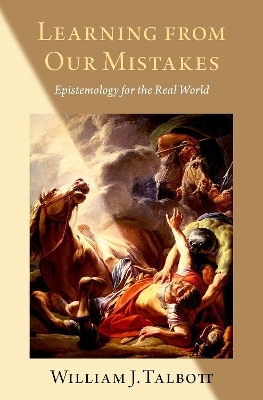
Learning from Our Mistakes
Oxford University Press Inc (Verlag)
978-0-19-756765-4 (ISBN)
Talbott's new model of rational belief is not a model of a theorem prover in mathematics – It is a model of a good learner. Being a good learner requires sensitivity to clues, the imaginative ability to generate alternative explanatory narratives that fit the clues, and the ability to select the most coherent explanatory narrative. Sensitivity to clues requires sensitivity not only to evidence that supports one's own beliefs, but also to evidence that casts doubt on them. One of the most important characteristics of a good learner is the ability to correct mistakes.
From this model, Talbott articulates nine principles that help to explain the difference between rational and irrational belief. Talbott contrasts his approach with the approach of historically important philosophers, including Socrates, Plato, Aristotle, Hume, Kant, Wittgenstein, and Kuhn, as well as with a range of contemporary approaches, including pragmatism, Bayesianism, and naturalism.
On the basis of his model of rational belief, Talbott articulates a new theory of prejudice, which he uses to help diagnose the sources of inequity in the U.S. criminal justice system, as well as to provide insight into the proliferation of tribal and fascist epistemologies based on alt-facts and alt-truth. Learning from Our Mistakes offers a new lens through which to interpret the history of Western epistemology and analyze the complicated social and political phenomena facing us today.
William J. Talbott is a Professor of Philosophy at the University of Washington, Seattle. He teaches and has published articles in epistemology; moral and political philosophy, including the philosophy of human rights; rational choice theory; and the philosophy of law. He is the author of a book on reliabilist epistemology, The Reliability of the Cognitive Mechanism and two books in the philosophy of human rights: Which Rights Should Be Universal? and Human Rights and Human Well-Being (both OUP).
Part I. The Proof Paradigm and the Causal Revolution in Epistemology
Introduction
Chapter 1. The Proof Paradigm
Chapter 2. Two Crises for the Proof Paradigm in the Enlightenment
Chapter 3. The End of the Proof Paradigm?
Chapter 4. The Causal Revolution in Epistemology
Part II. A New Way of Understanding Epistemic Rationality
Chapter 5. An Alternative to the Proof Paradigm for Ground-Level Rationality
Chapter 6. Two More Principles of Epistemic Rationality
Part III. And Epistemic Irrationality
Chapter 7. Epistemology for the Real World: Prejudices and Other Kinds of Epistemically Irrational Biased Beliefs
Chapter 8. Internally Inconsistent, Self-refuting, and Self-Undermining Views
Part IV. More on Epistemic Rationality
Chapter 9. Bayesian Accounts of Epistemic Rationality
Chapter 10. An Alternative to the Proof Paradigm for Metacognitive Rationality
Chapter 11. Necessity and Universality
Chapter 12. The Evolutionary Naturalist Challenge to the Reliability of Particular Epistemic Judgments
Part V. Clarifications, Responses to Objections, and Conclusion
Chapter 13. Clarifications and Objections
Conclusion
Appendix A
Appendix B
References
| Erscheinungsdatum | 30.09.2021 |
|---|---|
| Verlagsort | New York |
| Sprache | englisch |
| Maße | 241 x 163 mm |
| Gewicht | 635 g |
| Themenwelt | Geisteswissenschaften ► Philosophie ► Erkenntnistheorie / Wissenschaftstheorie |
| Geisteswissenschaften ► Philosophie ► Ethik | |
| ISBN-10 | 0-19-756765-7 / 0197567657 |
| ISBN-13 | 978-0-19-756765-4 / 9780197567654 |
| Zustand | Neuware |
| Haben Sie eine Frage zum Produkt? |
aus dem Bereich

![Was heißt Denken?. Vorlesung Wintersemester 1951/52. [Was bedeutet das alles?] - Martin Heidegger](/media/113619842)
